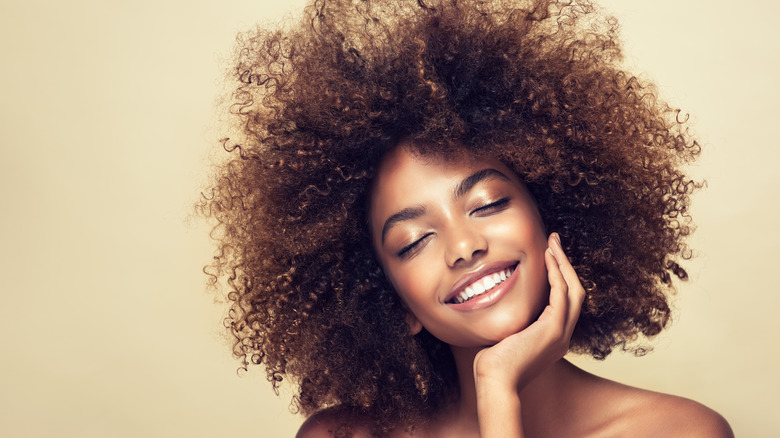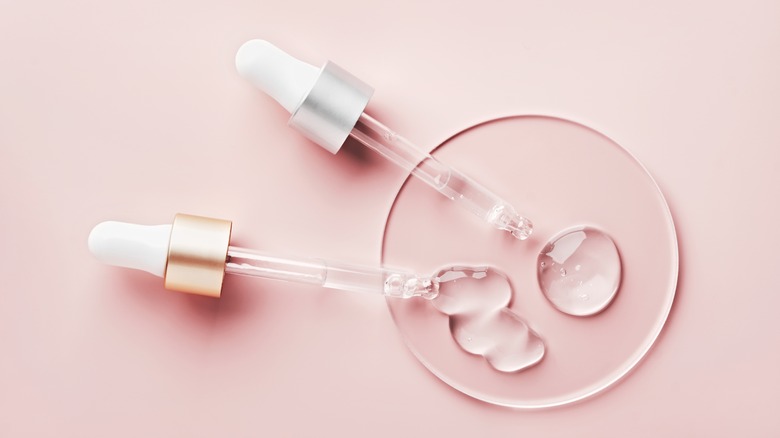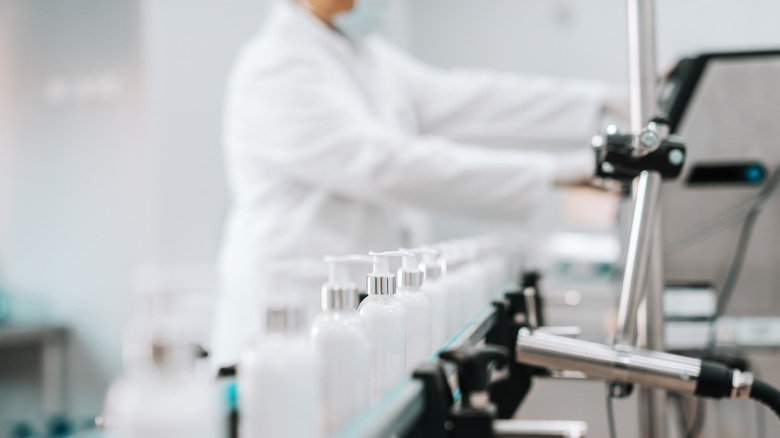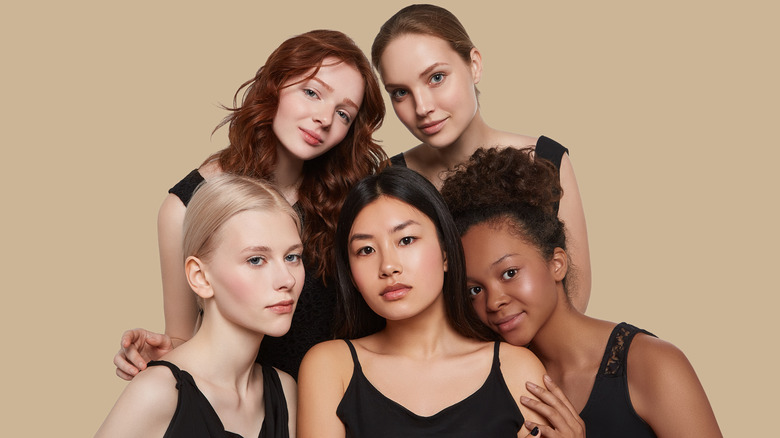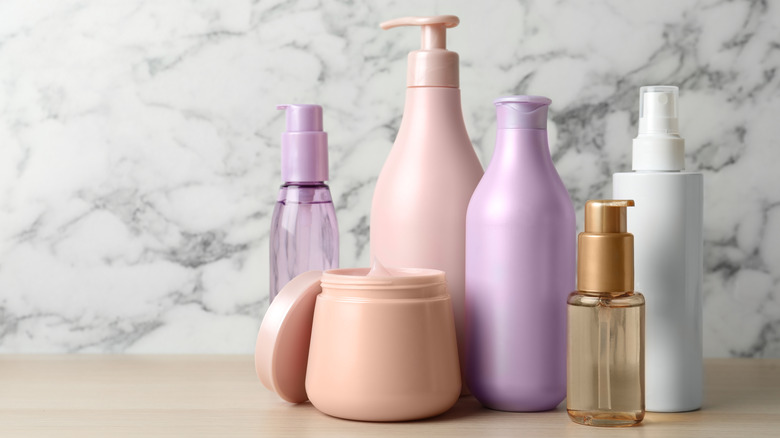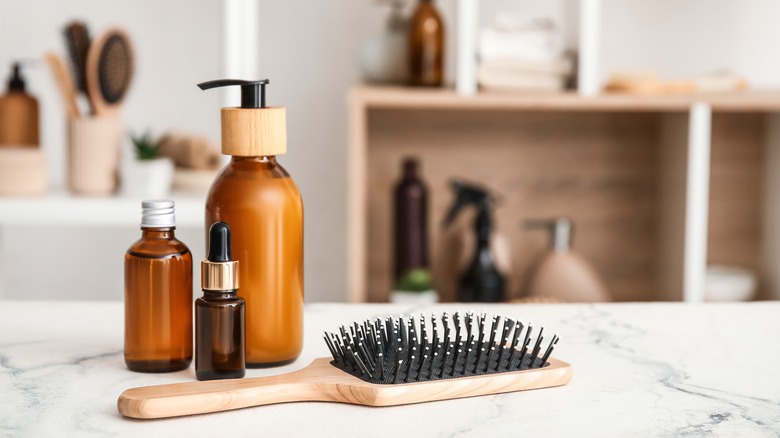What To Consider Before Using Silicones In Your Hair
We may receive a commission on purchases made from links.
In our lifelong quest to find the perfect haircare routine, we try a myriad of different products and methods. This is evident in the number of hair trends that come and go, spreading around on the internet constantly. In recent times, that trend has been rosemary oil or water, which helps to stimulate hair growth (via MindBodyGreen.) In the past, people were using everything from avocado to honey, and even onions, in the name of hair health (via Marie Claire).
You're probably noticing a pattern with these trends. More of us are turning more and more towards clean beauty, or only using natural ingredients on our faces, bodies, and hair. As more research comes out about how certain synthetic ingredients, particularly in products marketed towards women, are harmful, it makes sense that people are making a change. Items from menstrual products to even dry shampoos contain some sort of harmful chemical (via CNN).
One ingredient that's been getting some heat lately is silicones. A synthetic compound, silicones are found in numerous hair products. But are they actually bad simply because they're not natural?
What exactly are silicones?
According to Pattern Beauty, silicones are chemicals that come from silicons or mineral sand. They're used in a variety of haircare products, including shampoo, all different kinds of conditioners, serums, sprays, and creams. Silicones' pervasiveness in the haircare industry is due to their beneficial properties. They form a barrier on your hair, keeping moisture in, but also not letting anything bad in, similar to petrolatum.
Not only do they help with locking in moisture, but silicones also help with frizz control, says John Frieda. The barrier that silicones form is waterproof, preventing humidity from ruining the hair. They also soften the strands, providing slip in order to work out tangles and knots while adding shine (via Function of Beauty.) Additionally, silicones also add volume to the hair, which all sounds great. But there are major downsides too.
Although silicones keep pollution and other bad things at bay, the barrier they create can also prevent good ingredients from penetrating the hair shaft. This could potentially lead to a harmful buildup, according to Vogue India. However, it's worth noting not all silicones are made equally.
The different kinds of silicones found in hair products
As Allure clarifies, there are different kinds of silicones that are typically found in haircare items; evaporating, non-soluble, and water-soluble. Most silicones require the use of harsh, clarifying shampoos in order to be removed from the hair. Water-soluble silicones can be removed from the hair simply by rinsing or using a gentle shampoo, according to Naturally Curly, while water-soluble silicones sometimes act as humectants, drawing moisture into the hair.
Examples of these silicones are PEG-8 Dimethicone, Bis-PEG-18 methyl ether dimethyl silane, and Dimethicone PEG-X phosphate. Non-soluble silicones, on the other hand, are the kind you should probably avoid as much as possible. Without the excessive use of a clarifying shampoo, water cannot enter the hair shaft, nor can the silicone be removed, as The Hair Fuel warns. However, its hydrophobic nature can be beneficial when using heat on the hair.
If you don't want to use non-soluble silicones, avoid products with ingredients like Cyclomethicone, Pheryl Trimethicone, Dimethiconol, and Amodimethicone. Evaporating silicones, meanwhile, dissipate from the hair within 10 minutes to two hours, per Allure. And, unlike the other two, they don't need to be washed out. Yet, they still give hair the smoothening, light-reflecting quality that both water and non-soluble silicones provide. For products with evaporating silicones, look for Cyclomethicone and Cyclopentasiloxane in the ingredients.
How do different hair types react to silicones?
Regardless of hair type, silicones can build up in our locks over time, causing them to feel heavy and lifeless. As for the water-repelling aspect, this can create dryness in hair, according to Healthline. The use of silicones may cause you to use something stronger than your average shampoo, too. Considering clarifying shampoo can cause damage to your hair, it may not be the best option for people who have fine, brittle hair that's prone to breakage.
For curlier and kinkier textures, silicones should be used sparingly, particularly the non-soluble variety. Curlier hair can be more delicate, requiring extra moisture. Water soluble and evaporating silicones don't weigh down the hair as much, as The Mestiza Muse points out, preventing build-up and a dirty scalp. While some believe that silicones are required to "tame" frizzy or curly hair (via John Frieda), there are alternatives if you want to go silicone-free.
Prose suggests capryloyl glycerin, a humectant derived from coconut oil, as a great silicone alternative. Jojoba oil, shea butter, and aloe vera are also viable options if you're looking to go cleaner, per Healthline, since they provide moisture and shine to the hair while preventing frizz.
The best hair products with water-soluble silicones
For a shampoo that delivers lightweight hydration, the Maui Moisture Hibiscus Water Shampoo is a great option. It's formulated with a PEG-150 silicone, which is water-soluble, according to Naturally Curly. With aloe vera juice, watermelon extract, and hibiscus water, this shampoo was created especially for low-porosity hair, aiming to hydrate it without weighing it down.
The Olaplex No. 5 Bond Maintenance Conditioner is suitable for all hair types and textures. Although it contains Amodimethicone, it becomes water-soluble with the addition of Trideceth-12 and Cetrimonium Chloride, according to The Hair Fuel, two ingredients that the Olaplex conditioner possesses. The conditioner strengthens and softens hair, all without buildup, while giving it the moisture that sinks into the hair strands.
To keep hair in place, use the Ouidad Finishing Mist Setting and Holding Spray, which is formulated with PEG-12 Dimethicone, a water-soluble silicone, as Parkes Scientific confirms. The setting and holding spray utilizes jojoba oil and silk proteins to soften and smooth out curly hair. It also has witch hazel to dry hair more quickly, as well as vitamin E for extra hydration (via Prevention).
These are the best silicone-free hair products
For a hydrating heat protectant that doesn't have silicones, try the SEEN Blow-Out Creme. The fragrance-free formula contains hemisqualane, a plant-based silicone alternative that helps to control frizz, breakage, and dry hair, per Byrdie. The creme not only protects the hair from up to 450ºF but from pollution and UV rays too. It also comes in a scented version, with fresh notes of apples and oranges.
Also formulated with hemisqualane, the JVN Nurture Hydrating Shampoo has a silicone-free formula and it was created by our Fab Four favorite. The shampoo aims to clean hair without robbing the strands of their natural oil balance. While aloe vera hydrates hair, panthenol strengthens it, adding extra shine. Not only does it leave hair feeling moisturized and smooth, but this shampoo also imparts a light scent of blackcurrant, orchid, and vanilla.
For defined curls, try the Prose Custom Styling Gel. Formulated with okra and sea moss for definition, rice water and cornstarch to prevent frizz, and quinoa and pea protein for heat protection, this product has it all. A unique factor of the Prose gel is that it's customizable, meaning that Prose will ask you in-depth questions about your scalp health, hair type, styling habits, etc. to determine the best blend for your hair.
